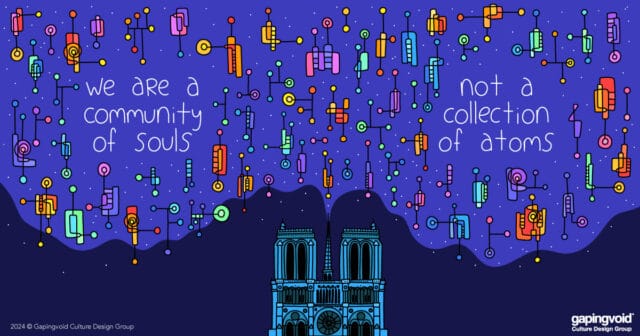
[A view from the London Microsoft offices, taken earlier today. Westminster Cathedral in the background, McDonald’s in the foreground. N.B. I first ate at this McDonald’s when I was twelve years old, with my dad and my sister, the first time I ever visited London. We stayed in a hotel just up the street, so every time I’m in this neighborhood the memories come flooding back to me, for this is the first neighborhood in the city I became familiar with. Somehow visiting Microsoft today seemed to make everything come around full circle, from that Big Mac & Fries all those years ago.]
I was visiting some folk at Microsoft UK today, talking about all things to do with Blue Monsters and social objects. I even brought along a bottle of Blue Monster wine. Though I can’t talk about what the meeting was about, here are some general thoughts I came away with, in no particular order:
1. “Agents of Calcification”. This is a rather snarky term I recently coined to describe the folks in a big company- any big company, not necessarily Microsoft- whose role isn’t to invent, make, or sell stuff, but to maintain and enhance the apparatus of bureaucracy, even at the expense of the business itself. Though these agents can serve a legitimate organizational purpose, when any company has too many of these people, you sadly end up with this cartoon [i.e. a “Big Lump o’ Death”]. The bigger the company gets, the more energy anybody trying to get anything interesting done will have to spend, trying to navigate around these folk. These folk are why I never take on salaried positions at big companies- I’ve never been very good at handling them. Despite what Frederick Winslow Taylor may have said, people are not machines. Form NEVER follows function.
2. The Blue Monster came from a simple observation I made early on in my career as a Microsoft watcher: That most people I’ve met who work there could be making more money elsewhere, and taking a lot less grief from the general public and the media. So what motivates them? The answer to this, in spite of all the baggage that comes with it, is what makes the company so interesting for me.
3. So what happens if the Simon Phipps’s of the world are right? So what happens if the future of software is indeed Open Source? How will Microsoft keep its shareholders happy? What if this recent article is right, and the unavoidable future is free software, and paid software is an equally unavoidable thing of the past? What then? Who has the answers? Do the answers actually exist yet? [N.B. I had the distinct pleasure of meeting Simon Phipps this summer at a dinner party, and I found him delightful company. Though his job is working with Open Source at Sun Microsystems, he also had a lot of nice things to say about Microsoft. A true gentleman.]
4. Are people [both inside and outside the company] ready to start seeing Microsoft not primarily as a software company, but as a media company? And if Microsoft’s business model turns away from paid software, towards advertising and free software, who will be the winners? Who will be the losers?
5. Calling Microsoft “Evil” is too easy. An adjective used by the incurious and intellectually lazy.
6. I find it re-assuring that most Microsofties I meet don’t seem too phased by the fact that I use a MacBook, not a PC. As Bill Gates said recently, “We like Apple, they buy a lot of software from us.”
7. A few weeks ago, I was having lunch with somebody very high up the global Digital Advertising foodchain. He was telling me about how once he was pitching for a ten million dollar account with a large international client. The client basically said, “I love the idea. Let’s do it. But… can you scale it to a hundred million dollar spend?” My friend sadly had to confess that his idea did not scale that large. My takeaway: Advertising clients are lining up to give talented folk their money. The only problem is, this brave new world is still in its infancy, much the same way TV advertising was in its infancy fifty years ago. Unlike traditional advertising media, demand for services exceeds supply. There lies the opportunity, but even the smartest minds in the business are still having a hard time figuring it out.
8. Though Google may be a fierce competitor of my friends in Redmond, in many ways what they’re doing actually makes Microsoft’s job a whole lot easier. Google broke a lot of ice when it came to creating a viable mass market for advertisers [understatement]. Thanks to Google, people ARE willing to spend money on online advertising in a way they simply weren’t before AdSense came along. If Microsoft [or any other company] can add something to the party, with ever more increasingly sophisticated offerings, they stand to gain on a massive scale. The clients are there, ready and willing to spend the big money. But now the onus is on Microsoft et al to provide a good enough reason.
9. As wonderful and interesting as “Web 2.0” has been to both me and a lot of my friends, the fact is, again, it’s still early days. Again, even the smartest people I know in this space have little idea about what’s going to happen next. Again, like TV advertising in the 1950s, we’re basically making it up as we go along. But that’s what makes it so exciting.
10. I still happily stand by what I said about Microsoft, late last year:
For too long, Microsoft has allowed other people- the media, the competition and their detractors, especially- to tell their story on their behalf, instead of doing a better job of it themselves.
We firmly believe that Microsoft must start articulating their story better- what they do, why they do it, and why it matters- if they’re to remain happy and prosperous long-term.
Let me put it another way: The future of Microsoft, and how Microsoft talks to people in the future, are one and the same. Yes, Virginia, the future of Microsoft is “Conversation.”



